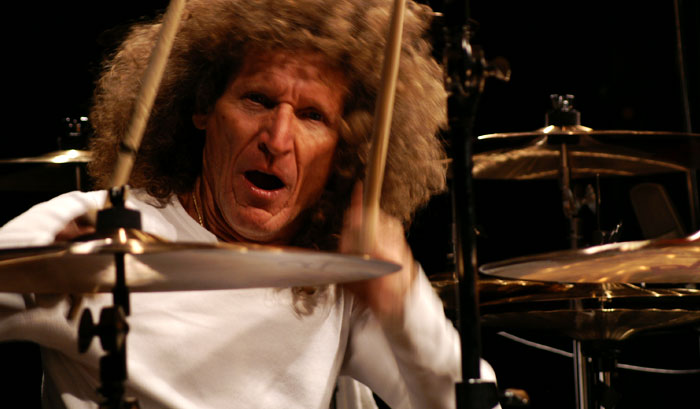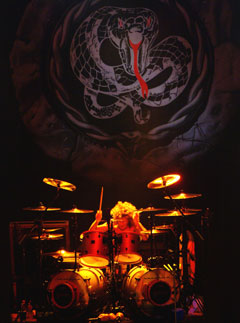


For thirty-five years Tommy Aldridge's fiery drumming has defined hard-rock showmanship. He's renowned for his virtuosity, groove, and for innovating such techniques as the use of double kick drums and playing with his bare hands.
Born in Jackson, Mississippi, Aldridge first rose to fame in the early '70s with Southern rock group Black Oak Arkansas. When that band folded, he rapidly evolved into the consummate freelancer, lending his skills to landmark rock discs by Ozzy Osbourne, Whitesnake, Thin Lizzy, and others. Along the way he's collaborated with a Who's Who of rock guitar greats, including Randy Rhoads, Steve Vai, Ted Nugent, Gary Moore, John Sykes, Vinnie Moore, Vivian Campbell, and Pat Travers.
Yamaha has the best shells, the best finishes, and the best hardware in the business. Why would I play anything else?
These days Tommy's principal endeavors are session work, recording and touring with a revamped Whitesnake, and traveling the world as a Yamaha drum clinician. "I manage to stay pretty busy," he chuckles.
We recently spoke to Tommy during one of those rare moments when he wasn't sitting behind a kit.
All those years playing drum solos with your bare hands--did you ever hurt yourself?
Occasionally. The thing about showing off is, you can't really make mistakes. If you're going to be a big fool onstage twirling drumsticks, you can't drop them! And playing with your hands can be a double-edged sword--literally. Those cymbals can be sharp! But I'm very diligent about it, and I pay very close attention. I'd never do anything that might jeopardize my long-term ability to play. I know guys who suffer from tendonitis and repetitive motion syndrome, and they don't do any of the crazy things I do.
How did you develop that technique?
When I started out I had to play with my bare hands, because my dad didn't approve of drums. The way he saw it, if you were a musician, you had to be a drug addict. So I hid the drums from him for six or seven years. I kept them in the storage shed where we kept the lawn tools. He never went in there--he had three boys, so he wasn't about to cut the grass! Of course, my mom knew. She was always supportive.

Did your dad's attitude ever change?
[Laughs.] When I started making more money than he did, he became a little more receptive.
What about your early experiments with double kick drums?
Well, necessity was the mother of invention. When I'd work on my rudiments as a kid, I started playing those quad and five-stroke rolls with three hits on the bass drum--you know, a double-stroke roll split between the hand and the foot. It sounded much heavier, but I soon realized I couldn't do it quickly enough. So I added a second kick drum and went through the same rudiments with my feet that I'd learned with my hands.
What did people think?
They thought, "That boy is crazy!" And I was, because I didn't know how to incorporate the technique at first. It was trial-and-error. [Laughs.] Just like my whole career!
You've been playing Yamaha drums for a long time.
I like what I like, and I don't bounce around much. I've been with Yamaha for the lion's share of my career. They make beautiful drums that look like jewelry, but are built like Sherman tanks. The drums sound great. They're consistent. The shells are round, and they stay round because Yamaha staggers the seams ply-by-ply. They have the best shells, the best finishes, and the best hardware in the business, and Yamaha is very open to suggestions from players. Why would I play anything else?
What's you current kit?
A Yamaha Absolute Maple Custom with vintage hoops on the tom shells. I use wood hoops because they open up the drum for greater sustain and a more open sound. I use a 12", 14", 16", and 18" toms. Depending on the situation, I switch between two sets of kick drums: a 24"x18" pair and a 22"x18". I also have a signature Yamaha snare coming out soon. It has a stainless-steel shell with die-cast aluminum hoops. It's a simple drum that's very inexpensive to build. Of course, sound was my first priority, but I also wanted to make it look cool and be reasonably priced.
You've had the opportunity to work with an amazing number of great musicians.
I can't take any credit for it. I just try to maximize the blessings that God has put in my life by trying to play to the best of my ability every time I put my butt on the stool. It's as simple as that.
























